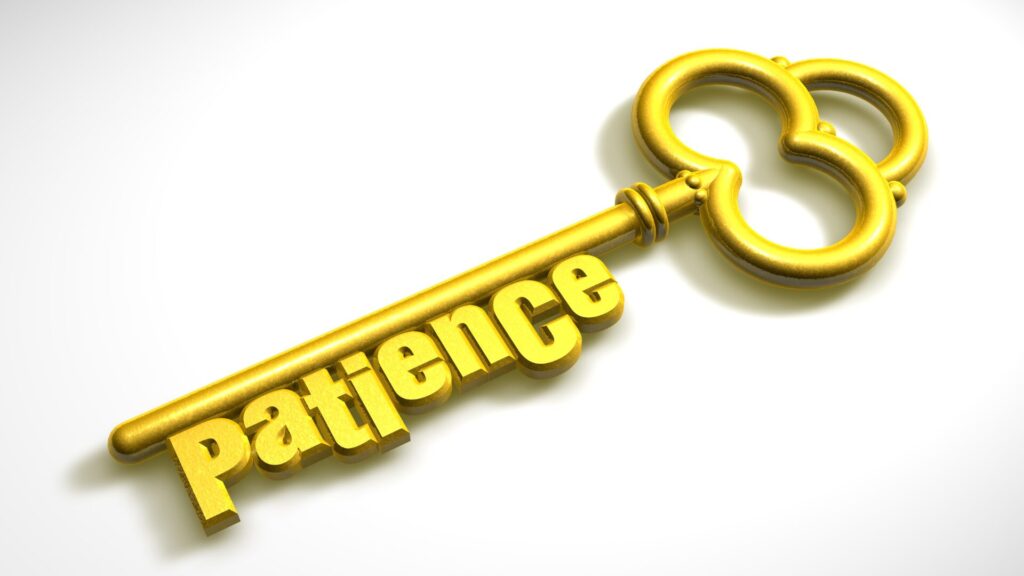Newsletter by Tina Bishai
May 2024
The Art of Mastering Patience: Unlocking Inner Serenity and Success
In a fast-paced world filled with constant deadlines and instant gratification, the art of mastering patience has become an elusive skill. For many, the ability to cultivate inner serenity and find success seems like an unreachable goal. But what if I told you that patience is not just a virtue, but a powerful tool that can transform your life?
In this article, we will explore the secrets to unlocking inner serenity and achieving success through the art of patience. Drawing from ancient wisdom and modern science, we will delve into practical strategies for developing patience and reaping its rewards. From improving relationships to boosting productivity, the benefits of patience extend far beyond simply waiting for something to happen.
Whether you’re looking to enhance your personal life or excel in your professional endeavors, mastering patience is the key to reaching your goals. Join us on this journey as we unravel the power of patience and discover how it can guide you toward a more fulfilling and successful life. So, are you ready to embrace the art of mastering patience? Let’s begin.
Understanding the concept of patience
Patience, often described as the ability to wait calmly in the face of adversity or delay, goes beyond mere tolerance. It is a mindset that allows us to navigate the complexities of life with tranquility and grace. Patience involves understanding that things take time to unfold and recognizing that rushing through the process may lead to suboptimal outcomes.
Mastering patience requires a shift in perspective, where we embrace the present moment rather than constantly yearning for what lies ahead. It is about finding contentment in the journey, rather than fixating solely on the destination. When we cultivate patience, we develop resilience, emotional intelligence, and the capacity to make better decisions.
The importance of patience in personal growth
Patience is a fundamental attribute that contributes to personal growth and self-improvement. It allows us to develop a growth mindset, where we embrace challenges as opportunities for learning and growth. By practicing patience, we can overcome setbacks and obstacles with perseverance, resilience, and an unwavering belief in our ability to succeed.
When we rush through life, we miss out on valuable lessons and experiences that shape our character. Patience enables us to savor the present moment, appreciate the journey, and learn from our mistakes. It empowers us to set realistic goals, break them down into manageable steps, and work towards them with unwavering determination.
Patience as a key to success
In a world where instant gratification is often prized, patience can be the differentiating factor between success and mediocrity. Successful individuals understand that achieving meaningful goals takes time, effort, and unwavering commitment. They embrace the process, knowing that the journey is just as important as the destination.
Patience allows us to stay focused, maintain momentum, and persevere through challenges. It helps us avoid impulsive decisions driven by short-term desires and instead make strategic choices that align with our long-term aspirations. By practicing patience, we can harness our energy and resources effectively, maximizing our chances of success.
The benefits of practicing patience
Practicing patience offers a multitude of benefits that extend beyond the surface level of waiting for something to happen. It enhances our emotional well-being by reducing stress, anxiety, and frustration. Patience allows us to approach situations with a calm and composed demeanor, leading to improved decision-making and problem-solving abilities.
Additionally, patience fosters better relationships by promoting effective communication and empathy. It enables us to listen actively, understand others’ perspectives, and respond thoughtfully. Patience strengthens bonds, builds trust, and cultivates a harmonious environment in both personal and professional settings.
Strategies for developing patience
Developing patience is a lifelong journey that requires consistent effort and self-reflection. Here are some practical strategies to cultivate patience in your daily life:
1. Practice mindfulness: Engage in mindfulness meditation or other mindfulness practices to cultivate present-moment awareness and reduce impulsive reactions.
2. Set realistic expectations: Avoid setting unrealistic timelines or expectations for yourself and others. Recognize that progress takes time and allow for flexibility and adaptability.
3. Practice delayed gratification: Challenge yourself to delay immediate rewards in favor of long-term benefits. This can be as simple as resisting the urge to check your phone constantly or indulging in instant gratification.
4. Develop empathy: Put yourself in others’ shoes to better understand their perspectives and motivations. This will help you respond with patience and compassion, even in challenging situations.
5. Learn from setbacks: View setbacks as opportunities for growth and learning. Embrace the lessons they offer and use them to inform your future actions and decisions.
Overcoming impatience in daily life
Impatience often stems from a desire for control and a fear of uncertainty. To overcome impatience in your daily life, consider the following strategies:
1. Practice acceptance: Embrace the fact that not everything is within your control. Learn to accept uncertainty and focus on what you can influence.
2. Reframe challenges: Instead of viewing challenges as obstacles, reframe them as opportunities for growth and development. Embrace them as stepping stones towards your goals.
3. Breathe and pause: When you feel impatience arising, take a moment to pause and take a deep breath. This simple act can help you regain composure and respond with patience.
4. Focus on the present: Redirect your attention to the present moment instead of fixating on the future. Engage in activities that bring you joy and help you stay grounded in the here and now.
Cultivating patience in relationships
Patience plays a crucial role in building and maintaining healthy relationships. Here are some strategies to cultivate patience in your interactions with others:
1. Practice active listening: Give your full attention to others when they are speaking. Avoid interrupting or jumping to conclusions. Truly listen and seek to understand before responding.
2. Exercise empathy: Put yourself in the other person’s shoes to gain a deeper understanding of their perspective. This will foster empathy and patience in your interactions.
3. Communicate openly and honestly: Express your thoughts and feelings clearly and respectfully. Avoid bottling up emotions, as this can lead to impatience and frustration.
4. Practice forgiveness: Let go of grudges and practice forgiveness. Holding onto past grievances only fuels impatience and hinders the growth of relationships.

Patience in the workplace
In the workplace, patience is essential for maintaining productivity, fostering teamwork, and achieving long-term success. Here's how you can cultivate patience in your professional life:
1. Manage expectations: Communicate realistic timelines and expectations to avoid unnecessary stress and pressure. Be transparent about what can be accomplished within a given timeframe.
2. Practice effective time management: Prioritize tasks, set realistic deadlines, and allocate resources appropriately. This will help you avoid feeling overwhelmed and maintain a sense of calm and focus.
3. Delegate and collaborate: Trust your colleagues and delegate tasks when necessary. Recognize that working together as a team can often yield better results than trying to accomplish everything on your own.
4. Embrace constructive feedback: Be open to feedback and view it as an opportunity for growth. Patience allows you to listen to feedback without becoming defensive, enabling personal and professional development.
Patience as a tool for stress management
Patience is a powerful tool for managing stress and promoting mental well-being. When faced with stressful situations, consider these strategies:
1. Practice deep breathing: Deep breathing exercises can help activate the body’s relaxation response and reduce stress levels. Take slow, deep breaths, and focus on the sensation of each inhale and exhale.
2. Engage in stress-reducing activities: Incorporate activities that help you relax and unwind into your routine. This can include yoga, meditation, journaling, or engaging in hobbies that bring you joy.
3. Maintain a healthy work-life balance: Prioritize self-care and ensure you have time for rest and rejuvenation. Set boundaries between work and personal life to avoid burnout and excessive stress.
4. Seek support: Reach out to friends, family, or professional support if you feel overwhelmed. Sometimes, talking to someone can provide valuable perspective and alleviate stress.
Embracing patience for a more fulfilling life
Patience is not just a virtue; it is a powerful tool that can unlock inner serenity and guide you towards success. By understanding the concept of patience, recognizing its importance in personal growth and success, and implementing practical strategies to cultivate patience, you can experience the multitude of benefits it offers.
Embrace patience as a way of life and witness its transformative impact on your relationships, personal growth, and professional endeavors. Remember, the art of mastering patience is not about simply waiting for something to happen; it is about embracing the journey, savoring the present moment, and trusting in the process. So, are you ready to unlock the power of patience and embark on a more fulfilling and successful life?
Conscious Awareness Services
Contact us for more information!
Autism & ADHD Masterclass
How To Reduce Your Child’s Symptoms From Autism & ADHD In As Little As 60 Days – please share widely and click here.

